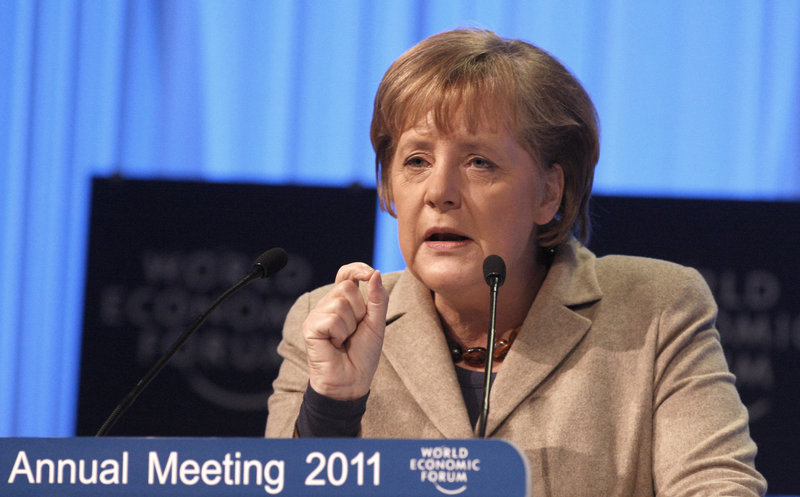DAVOS, Switzerland — German Chancellor Angela Merkel and British Prime Minister David Cameron swung their weight behind calls to clinch a global trade deal Friday, citing it as a key test for the international community’s ability to cooperate in reviving the world economy.
Both leaders warned that failure to conclude the so-called Doha round of trade talks risks setting back efforts to liberalize global commerce by years, if not decades.
Their call came on the eve of a meeting of commerce ministers in Davos, Switzerland, timed to coincide with the World Economic Forum at which business and political leaders mingle each year to discuss the state of the planet.
“The conclusion of the Doha round is of utmost importance,” said Merkel. “We are literally meters away from the finishing line.”
She warned that if a deal isn’t reached soon, “decades will go by without this opportunity offering itself again.”
The trade talks, launched 10 years ago in the Qatari capital Doha, have been declared moribund by experts for a long time, as rich and poor countries clash over lowering tariffs and easing access to each others’ markets.
“People feel like this is somehow Monty Python’s dead parrot, but we won’t stop talking about it,” Cameron said. “I profoundly believe that is not true.”
Proponents say a Doha deal could add billions to the global economy. “This is a stimulus that doesn’t cost money, so it is the stimulus that we need,” Cameron said.
Experts remain skeptical that a deal can be reached this year, mainly because China and the United States remain at loggerheads on key issues. Pushing the talks into 2012 — a U.S. presidential election year — would make a conclusion even less likely, because the sensitive issue of trade would be a hard sell for politicians of any stripe.
“It may not be dead, but it’s playing possum,” said Jean-Pierre Lehmann, professor of business at the IMD business school in Lausanne.
Not reaching a deal this year could be a firm sign that the world is headed for one or more trade wars, Lehmann said.
The discussion over trade echoes concerns that the global economic downturn since 2007 has made it harder for leaders to put immediate national interests aside and work together toward a bigger goal — be it combating climate change, global food price rises or currency speculation.
U.N. chief Ban Ki-moon warned that the world’s current economic model itself was a problem, an environmental “global suicide pact” that will result in disaster if it isn’t reformed.
“We need a revolution,” the secretary general of the U.N. told a panel at the World Economic Forum on how best to make the global economy sustainable. “Climate change is also showing us that the old model is more than obsolete.”
Send questions/comments to the editors.



Success. Please wait for the page to reload. If the page does not reload within 5 seconds, please refresh the page.
Enter your email and password to access comments.
Hi, to comment on stories you must . This profile is in addition to your subscription and website login.
Already have a commenting profile? .
Invalid username/password.
Please check your email to confirm and complete your registration.
Only subscribers are eligible to post comments. Please subscribe or login first for digital access. Here’s why.
Use the form below to reset your password. When you've submitted your account email, we will send an email with a reset code.